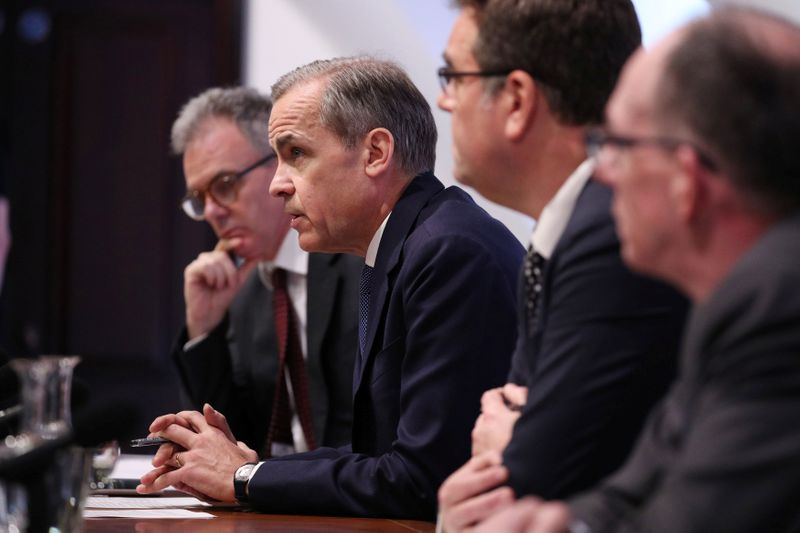By David Milliken and William Schomberg
LONDON (Reuters) - The Bank of England kept interest rates steady at Governor Mark Carney's final policy meeting as it saw signs of a post-election pick-up in growth which weakened the case for immediate action to help the lacklustre economy.
Financial markets had seen a 50% chance of a cut on Thursday, which would have echoed moves last year by the U.S. Federal Reserve and the European Central Bank.
But the Monetary Policy Committee (MPC) again split 7-2 in favour of keeping Bank Rate at 0.75%, with external members Michael Saunders and Jonathan Haskel voting for a cut.
Sterling jumped around half a cent against the dollar though interest rate futures still pointed to a rate cut, probably in May, after Carney hands over to Andrew Bailey.
Carney highlighted encouraging signs for the economy in early 2020, but said the BoE was waiting to see if this would be borne out in hard economic data.
"To be clear, these are still early days, and it is less of a case of 'so far so good' than 'so far, good enough'," he said.
ING economist James Smith said the business surveys which have pointed to a recovery sometimes overstated upturns and downturns.
"The lingering question of policy easing is unlikely to go away just yet. It all really hinges on whether the economy sees a Brexit bounce," he said, adding that either way, Brexit uncertainty was likely to return later this year.
Prime Minister Boris Johnson's unexpectedly emphatic Dec. 12 election win has boosted optimism, particularly among businesses who had cut investment while parliament failed to resolve the Brexit impasse.
But the BoE downgraded its longer-term view for the economy, saying border checks from 2021 would add to drags on growth, and it kept the door open to lower rates if the signs of a pick-up prove illusory.
"Policy may need to reinforce the expected recovery in UK GDP growth should the more positive signals from recent indicators of global and domestic activity not be sustained or should indicators of domestic prices remain relatively weak," the BoE said in its quarterly Monetary Policy Report.
If growth does gather pace, "some modest tightening" of policy might be needed further ahead.
Asked if he had made any policy mistakes during his 6-1/2 years as governor, Carney said he had no regrets, and defended his trademark 'forward guidance' on interest rates as essential for central bankers at turning points in the economy.
Before Thursday's decision, many in financial markets thought Carney had hinted in a January speech that he favoured a "precautionary" rate cut this month. Carney said he had merely been recounting the debate at December's MPC meeting.
BREXIT FRICTION
The BoE dropped its message that future rate hikes would be "limited and gradual", guidance that Carney said dated back to when a more rapid pace of rate hikes might have looked likely.
The BoE said Britain's economy probably did not grow at all in late 2019, when parliament forced a delay to Brexit and the snap election.
That knocked the growth forecast for 2020 to just 0.8%, the slowest since the financial crisis, although by the final quarter growth should be around 1.2%, the BoE said.
Britain will formally leave the EU at 2300 GMT on Friday, with an 11-month transition period to negotiate a trade deal with the EU or face tariffs on its exports from 2021.
Even with a deal, the BoE said it now pencilled in trade frictions from the start of 2021. Lower immigration and weaker business investment would also weigh on the economy.
"The UK is entering a decade of potentially profound structural change," Carney said.
The BoE said it no longer expects British productivity growth to improve from a dismal 0.5% a year, meaning living standards will struggle to improve much.
Weak potential growth also means even a small pick-up in business activity could turn inflationary.
Inflation is set to stay just below the BoE's 2% target over the next three years if rates stay at 0.75%.

But Carney said this did not mean market bets on a cut in Bank Rate to 0.5% this year were right. Based on the current economic outlook, this would cause inflation to overshoot its target, he said.